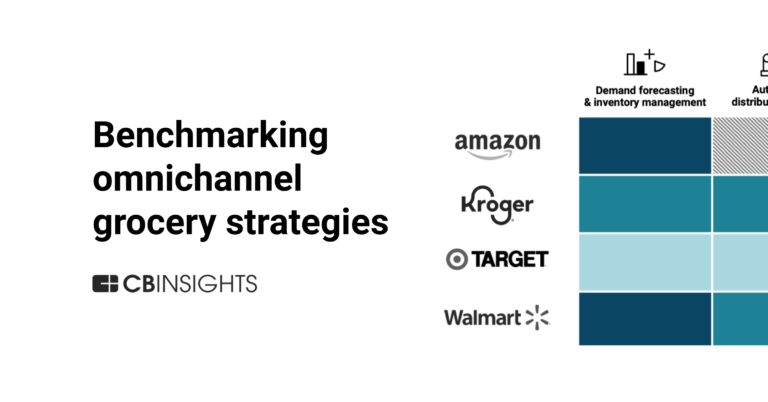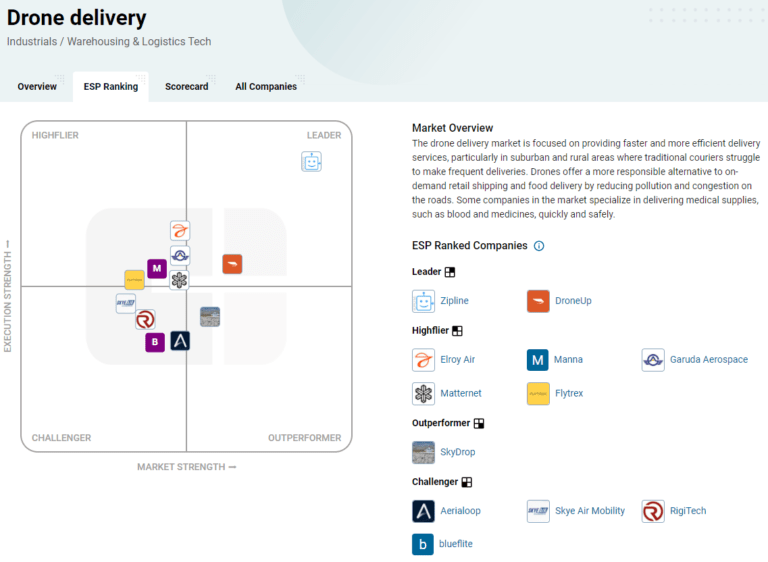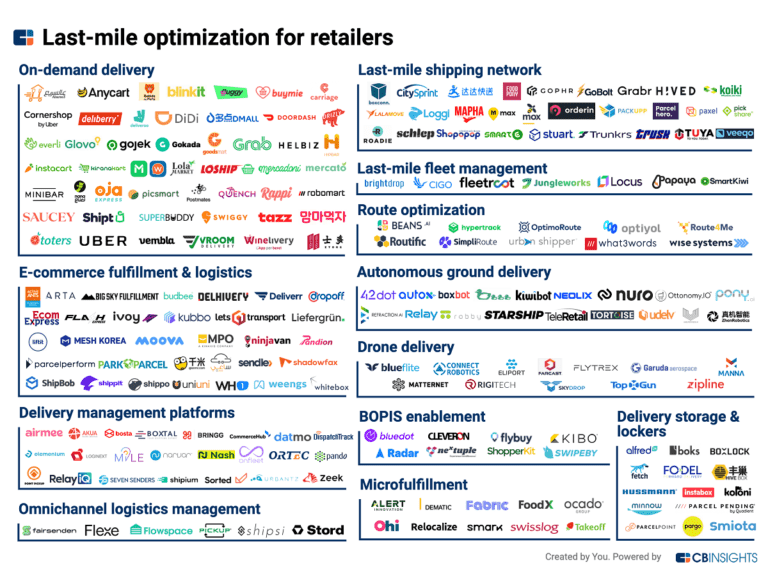
Zipline
Founded Year
2014Stage
Series F | AliveTotal Raised
$817.16MValuation
$0000Last Raised
$330M | 2 yrs agoRevenue
$0000Mosaic Score The Mosaic Score is an algorithm that measures the overall financial health and market potential of private companies.
-23 points in the past 30 days
About Zipline
Zipline specializes in autonomous delivery systems and instant logistics within the drone delivery industry. The company designs, manufactures, and operates a large-scale automated delivery system that provides on-demand services for various sectors. Zipline's technology primarily supports the healthcare industry by facilitating urgent deliveries, such as blood and vaccines, and retail partnerships for home delivery. Zipline was formerly known as Romotive. It was founded in 2014 and is based in South San Francisco, California.
Loading...
ESPs containing Zipline
The ESP matrix leverages data and analyst insight to identify and rank leading companies in a given technology landscape.
The drone delivery providers market focuses on the operational deployment of drones to deliver goods, distinct from developers who create the technology. These providers use existing drone technology to offer efficient delivery solutions, particularly in remote and urban areas, propelling advancements in sectors like e-commerce, healthcare, and food services. They collaborate with retailers and se…
Zipline named as Leader among 12 other companies, including Matternet, Skye Air, and Manna.
Loading...
Research containing Zipline
Get data-driven expert analysis from the CB Insights Intelligence Unit.
CB Insights Intelligence Analysts have mentioned Zipline in 8 CB Insights research briefs, most recently on Nov 18, 2024.
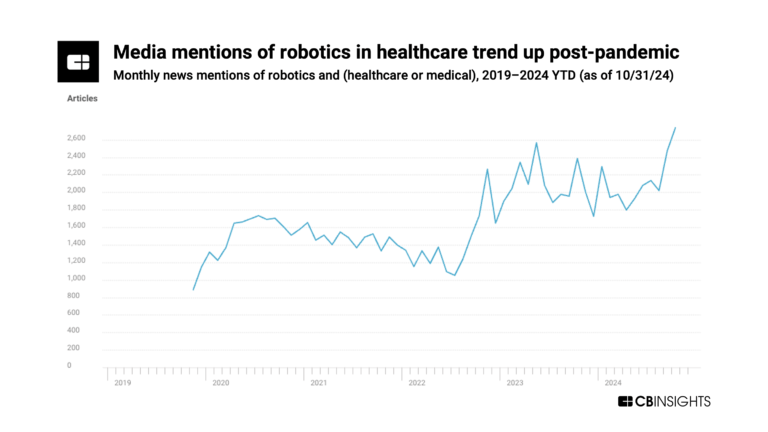
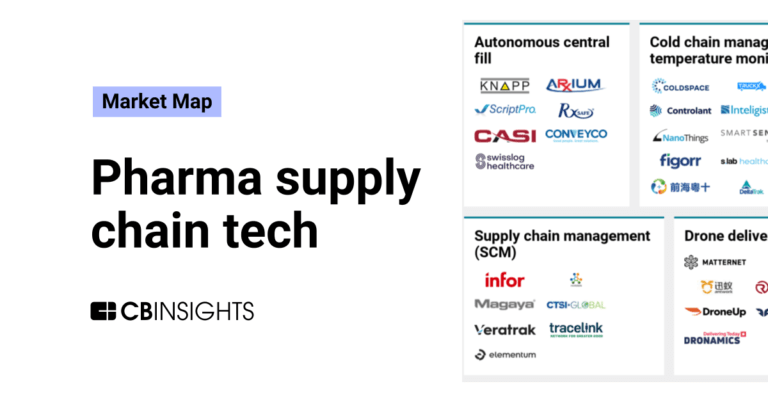
Feb 23, 2024
The pharma supply chain tech market map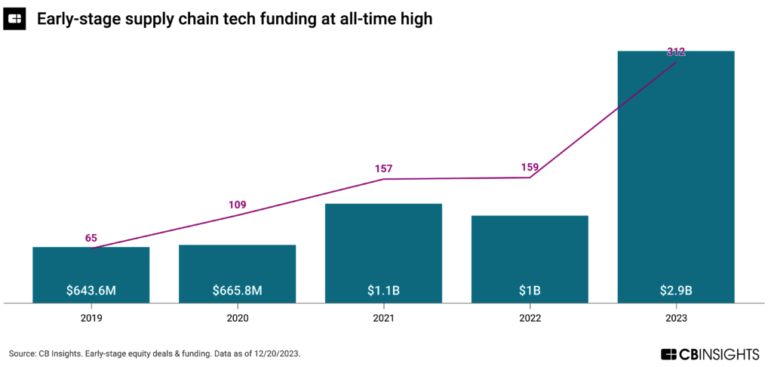
Dec 22, 2023
5 supply chain markets gaining momentum in 2024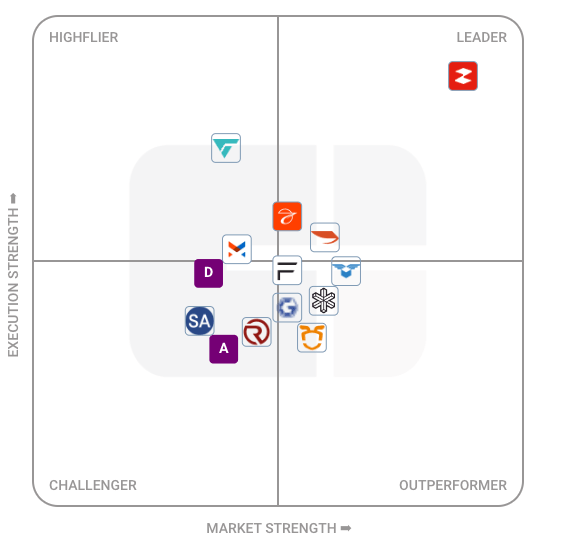
Oct 12, 2023
What is helping drone delivery leaders take flight?
Expert Collections containing Zipline
Expert Collections are analyst-curated lists that highlight the companies you need to know in the most important technology spaces.
Zipline is included in 7 Expert Collections, including Supply Chain & Logistics Tech.
Supply Chain & Logistics Tech
6,273 items
Companies offering technology-driven solutions that serve the supply chain & logistics space (e.g. shipping, inventory mgmt, last mile, trucking).
Unicorns- Billion Dollar Startups
1,261 items
Robotics
2,015 items
This collection includes startups developing autonomous ground robots, unmanned aerial vehicles, robotic arms, and underwater drones, among other robotic systems. This collection also includes companies developing operating systems and vision modules for robots.
Game Changers 2018
70 items
Aerospace & Space Tech
4,438 items
These companies provide a variety of solutions, ranging from industrial drones to electrical vertical takeoff vehicles, space launch systems to satellites, and everything in between
Artificial Intelligence
7,222 items
Zipline Patents
Zipline has filed 44 patents.
The 3 most popular patent topics include:
- aerodynamics
- operating amusement attractions
- unmanned aerial vehicle manufacturers

Application Date | Grant Date | Title | Related Topics | Status |
|---|---|---|---|---|
8/15/2023 | 11/26/2024 | Audio engineering, Loudspeakers, Aerodynamics, Firearm actions, Radio electronics | Grant |
Application Date | 8/15/2023 |
|---|---|
Grant Date | 11/26/2024 |
Title | |
Related Topics | Audio engineering, Loudspeakers, Aerodynamics, Firearm actions, Radio electronics |
Status | Grant |
Latest Zipline News
Jan 31, 2025
January 30, 2025 20:30 ET Dallas, Texas, Jan. 30, 2025 (GLOBE NEWSWIRE) -- As pharmacists and healthcare advocates, we bring a unique blend of expertise and commitment to addressing Nigeria’s healthcare challenges. Dr. Precious Azino Usuemerai has expertise in clinical pharmacy and business administration; his leadership of ZeenoHealth Pharma, a COVID-19 medication distributing platform in Nigeria exemplifies innovative, patient-centered solutions. Otuto Amarauche Chukwu has expertise in policy and health systems strengthening; a social impact innovator who has provided thought leadership in pharmaceutical and medicines supply chain policy . Pharm Cordia Ogbeta is dedicated to leveraging digital health to expand healthcare access via his clinical pharma startup, Showcare. Pharm Olumide Ibikunle is a well-rounded commercial lead, a champion of access to medicines, and an advocate of sustainable healthcare financing models and impact-driven ventures. Together, these professionals embody the spirit of innovation and commitment necessary to tackle the complex healthcare challenges facing Nigeria today. Their collaborative efforts signal a promising shift towards more efficient, inclusive, and sustainable healthcare solutions for all Nigerians. While working as a medical outreach volunteer in Gombe, Northeast Nigeria, Dr. Usuemerai encountered the case of Amina, a 23-year-old pregnant woman who was experiencing complications and had signs of pre-eclampsia. Before the medical outreach, she could not access quality healthcare as the facility that could handle her case comprehensively was several miles away. Even if there were one close to her, Amina would have found it difficult to foot the medical bills associated with her care. The medical outreach was a lifesaver for her and her baby and provided her with a team of medical personnel to support her care, albeit for a short while. Because medical outreaches are few and far between, the medical team introduced a telemedicine app to the community health workers (who had helped with the planning and implementation of this outreach). This was a more sustainable approach, and through this app, they were able to follow up with Amina’s care till delivery and not just Amina, but hundreds of other beneficiaries of the outreach. This shows the importance of leveraging healthcare innovation in underserved and resource-limited contexts. Such innovations usually carry with it, some form of risk capital. In Nigeria, where over 200 million people reside, healthcare remains one of the most pressing challenges. Despite the country's economic potential, its healthcare system is overburdened, underfunded, and often inaccessible to most of its population. For instance, over 60% of Nigeria’s rural population lacks access to functional primary healthcare centers (Source: Vanguard ). However, there is a powerful opportunity to improve clinical outcomes and elevate the standard of care: risk capital. By channeling venture investments, impact funds, and other forms of innovative financing into Nigeria’s healthcare sector, risk capital can address systemic inefficiencies and bring life-changing solutions to patients nationwide. The case for risk capital in Nigeria’s health system Risk capital, characterized by investments in high-growth potential ventures, has revolutionized industries globally. Yet, its application to healthcare in emerging markets like Nigeria remains underexplored. Nigeria’s healthcare challenges are profound: According to the Nigeria Medical Association, the doctor-to-patient ratio stands at 1:9000 (far below the WHO-recommended 1:600; Source: The Lancet , WHO Nigeria ); maternal and infant mortality rates are among the highest globally; and infectious diseases like malaria, tuberculosis, and HIV persist as significant health threats. However, there are opportunities for improvement. Nigeria’s growing middle class, increasing mobile connectivity, and burgeoning tech ecosystem create fertile ground for disruptive solutions. Risk capital, with its inherent tolerance for uncertainty and focus on high returns, is uniquely suited to catalyze innovation in this space, from telemedicine and digital health solutions to financing and improved access. Such opportunities include: Telemedicine and digital health solutions Nigeria’s mobile penetration rate exceeds 90%, providing a platform to scale digital health solutions (Source: Datareportal ). Investing significantly in telemedicine platforms has the potential to expand healthcare access to millions of Nigerians over several years, reducing preventable deaths and improving overall health outcomes. Such initiatives could address healthcare accessibility challenges, especially in underserved and remote areas. Startups like LifeBank and Helium Health have already demonstrated the potential of leveraging technology to solve critical healthcare problems (Source: LifeBank ). LifeBank, for instance, uses digital platforms to connect blood banks with hospitals in urgent need, saving countless lives. We also have personal experiences to buttress this. During the COVID-19 pandemic, Dr. Precious Azino Usuemerai, founder of ZeenoHealth Pharmaceuticals, a nationwide COVID-19 drug distribution startup, played a pivotal role in delivering affordable healthcare to underserved communities using digital health tools. Through his startup, Nigerian patients and their loved ones could easily get all effective treatments against COVID-19 infections. ZeenoHealth connected patients with healthcare professionals and helped them access crucial medicines to manage pre-existing conditions and other acute illnesses, ensuring continuity of care despite movement restrictions. Pharm. Otuto Amarauche Chukwu co-founded MedChain Solutions in 2017 with a vision to improve medicines supply chains in Nigeria and improve access to medicines at the last mile. Using learnings from Singularity University’s Executive program in January 2020, he digitalized and improved the service offerings of the company, making it instrumental in providing various families and organizations with essential health commodities and services during the COVID-19 lockdown in Nigeria. The company continues to help many companies access essential medicines. Similarly, Dr. Cordia Peter Ogbeta, founder of Showcase Pharmacy Ltd., leveraged digital media to transform patient adherence practices. By using targeted communication strategies and digital platforms, he ensured patients remained informed and consistently followed their medication regimens, directly enhancing treatment success rates. Pharm Olumide Emmanuel Ibikunle, during his tenure at Reckitt Nigeria, utilized advanced tech apps to revolutionize inventory management for healthcare customers. These apps proactively reminded customers when to restock, ensuring they always had quality products available to meet patient needs. These examples highlight the transformative impact of digital and technological innovations in addressing healthcare challenges and improving outcomes. With risk capital, telemedicine platforms can expand access to healthcare for rural communities, where over 46% of Nigerians reside (Source: World Bank ). By financing these startups, investors can help address the access gap while generating significant returns as these platforms scale. Pharmaceutical manufacturing and drug distribution Nigeria’s pharmaceutical supply chain is riddled with inefficiencies, counterfeit drugs, and high costs ( Source: BMC Public Health , BMJ ). Risk capital can empower local pharmaceutical manufacturers to modernize production, ensuring affordable and high-quality medications. Moreover, investments in logistics and supply chain innovations, like drone delivery for medications, can dramatically improve access to essential drugs in remote areas. For example, since 2016, Zipline has completed 13,000 blood deliveries to remote areas in Rwanda, with 4,000 of these specifically addressing medical emergencies(Source: CNBC ). Investing in Nigeria’s pharmaceutical logistics could greatly improve supply chain efficiency, leading to reduced medication costs and a decline in the prevalence of counterfeit drugs. Such advancements would enhance access to affordable and authentic medications, improving healthcare outcomes across the country. For example, Zipline has been able to raise $500 million between 2019 to 2021, which it deployed to significantly improve healthcare access by ensuring timely delivery of critical medical supplies in Africa (Source: TechCrunch , TechCrunch ). In Ghana, Zipline's drone logistics system delivered over 112,000 vaccine doses to remote areas in one year, enabling an additional 14,979 full immunization courses and preventing 688 cases of acute disease. Moreover, the cost-effectiveness of this approach is remarkable, with the last-mile delivery cost per vaccine dose as low as $0.27, compared to $0.47 for traditional ground-based methods (Source: Zipline ). These results highlight the transformative potential of drone technology in improving health outcomes while optimizing healthcare system resources. Diagnostics and preventive care The lack of diagnostic infrastructure exacerbates Nigeria’s healthcare crisis. Early detection of diseases is rare, often leading to late-stage presentations and poor outcomes. Risk capital can fund ventures developing affordable diagnostic tools tailored to local needs, such as portable malaria test kits or AI-powered screening technologies for non-communicable diseases. Health insurance and financing Only 5% of Nigerians have health insurance, leaving millions vulnerable to catastrophic health expenditures (Source: Global Health Economics Journal 2024 ). Investing in health-fintech startups in Nigeria could significantly expand access to affordable healthcare through innovative micro-insurance models. For example, WellaHealth, a Nigerian health-tech startup, has effectively leveraged funding to scale its services. In 2019, the company secured $120,000 from the Techstars Impact Accelerator ( Disrupt Africa ), and in 2022, it received a $100,000 grant from Google for Startups Black Founders Fund ( Benjamin Dada ). These investments have empowered WellaHealth to develop micro-insurance plans that provide access to malaria tests and medications through a network of over 3,000 pharmacies across Nigeria ( Swiss Re Foundation ). This demonstrates how strategic funding can enable startups to bridge healthcare gaps and improve coverage for underserved populations. Risk capital can support the growth of micro-insurance models and health-fintech startups that use data-driven approaches to provide affordable coverage to low-income populations. Beyond direct healthcare improvements, investments in the health sector generate broad economic benefits. A robust healthcare system enhances workforce productivity, attracts medical professionals, and creates jobs in emerging health-tech industries. Furthermore, successful healthcare ventures can inspire a virtuous cycle of reinvestment, with profits redirected into solving other systemic challenges. Moreover, risk capital’s involvement brings more than just funding. It introduces a culture of innovation, accountability, and scalability. Investors often provide strategic guidance, mentorship, and access to global networks, accelerating the development of impactful solutions. To reap these rewards, however, supportive policies are essential. The Nigerian government must streamline regulatory approval processes, ensure intellectual property protections, and incentivize private sector participation through tax benefits and public-private partnerships. Equally important is collaboration between stakeholders. International development agencies, local entrepreneurs, and impact investors must unite under a shared vision of a healthier Nigeria. For example, partnerships with organizations like ECOWAS or the Gates Foundation could amplify impact and provide the resources needed to scale healthcare innovations regionally. Programs that blend concessional funding with venture capital—a hybrid model—can reduce perceived risks and encourage larger private sector commitments. We believe that risk capital represents a transformative tool for addressing Nigeria’s healthcare challenges. Substantial investments in healthcare innovation have been shown to yield significant economic and health benefits. For example, a study by the Brookings Institution highlights that investing in health across developing countries could generate a $4.4 trillion boost in economic benefits by 2040, equivalent to a 7% increase in GDP ( Brookings Institution ). Similarly, initiatives like the Million Lives Fund, a $100 million annual healthcare venture fund, aim to save 1 million lives annually by 2030 ( NY Artisinal ). These examples illustrate the potential of targeted investments to transform healthcare access, save lives, and drive economic growth, making a compelling case for risk capital in Nigeria’s healthcare sector, proving its value both socially and economically. By unlocking innovative solutions, empowering local entrepreneurs, and fostering a culture of resilience, it can dramatically improve clinical outcomes for millions of Nigerians. For pharmacists like us, who are deeply invested in the health and well-being of our communities, this is more than an economic opportunity—it is a moral imperative. With visionary investments and strategic partnerships, we can help shape a future where no Nigerian is denied access to quality healthcare.
Zipline Frequently Asked Questions (FAQ)
When was Zipline founded?
Zipline was founded in 2014.
Where is Zipline's headquarters?
Zipline's headquarters is located at 333 Corey Way, South San Francisco.
What is Zipline's latest funding round?
Zipline's latest funding round is Series F.
How much did Zipline raise?
Zipline raised a total of $817.16M.
Who are the investors of Zipline?
Investors of Zipline include NVIDIA Inception Program, Scottish Mortgage Investment Trust, Temasek, Katalyst Ventures, Emerging Capital Partners and 36 more.
Who are Zipline's competitors?
Competitors of Zipline include Elroy Air, Aviant, 42dot, PABLO AIR, Drone Express and 7 more.
Loading...
Compare Zipline to Competitors

Flytrex focuses on providing drone delivery services within the suburban U.S. market. Its main offering includes delivering a variety of products, such as food and essentials, directly to customers' backyards using drones. Flytrex primarily serves the quick-service restaurants, retailers, and events sectors. It was founded in 2012 and is based in Tel Aviv, Israel.

Matternet is a company that specializes in the development and operation of autonomous drone networks for package delivery within the healthcare and commerce sectors. The company offers zero-emission delivery services using drones that are FAA Type Certified. Matternet's technology is designed to transform logistics in developed economies and provide innovative solutions for new economies. It was founded in 2011 and is based in Mountain View, California.

Manna specializes in rapid drone delivery services within the logistics and delivery industry. The company offers a drone-based delivery solution that promises to deliver items such as food and medical supplies within an average of 3 minutes, focusing on affordability, sustainability, and safety. Manna's drones are designed to support local businesses by providing an alternative delivery method that is both greener and quieter than traditional road-based delivery systems. It was founded in 2019 and is based in Dublin, Ireland.

Starship Technologies specializes in autonomous robot delivery within the delivery industry. The company offers solutions for food and package deliveries using self-driving robots designed to improve efficiency and sustainability. Starship's robots are utilized across various settings, including towns, cities, and campuses, to provide a convenient delivery experience. It was founded in 2014 and is based in San Francisco, California.
Airpost is a drone-related delivery system for distances of over 300 km with a capacity of up to 5 kg. It also uses the clean fuel - hydrogen.

Udelv develops autonomous delivery vehicles for the transportation and logistics industry. The Transporter is an autonomous electric vehicle designed for multi-stop, last-mile, and middle-mile deliveries. Udelv's vehicles have level 4 autonomy and include a cargo container known as the uPod, along with fleet management and tele-operation tools for delivery operations. It was founded in 2016 and is based in Burlingame, California.
Loading...
